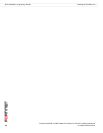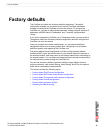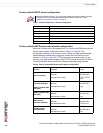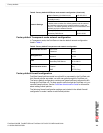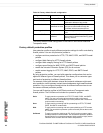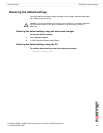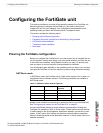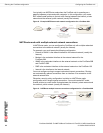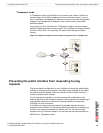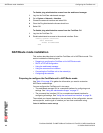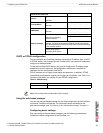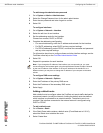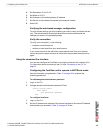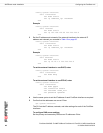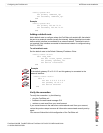
FortiGate-50A/50B, FortiWiFi-50B and FortiGate-100 FortiOS 3.0 MR4 Install Guide
34 01-30004-0265-20070831
Planning the FortiGate configuration Configuring the FortiGate unit
You typically use NAT/Route mode when the FortiGate unit is operating as a
gateway between private and public networks. In this configuration, you create
NAT mode firewall policies to control traffic flowing between the internal, private
network and the external, public network (usually the Internet).
Figure 8: Example NAT/Route mode network configuration for a FortiGate-50A.
.
NAT/Route mode with multiple external network connections
In NAT/Route mode, you can configure the FortiGate unit with multiple redundant
connections to the external network (usually the Internet).
For example, you could create the following configuration:
• External or WAN1 is the default interface to the external network (usually the
Internet)
• Modem is the redundant interface to the external network for the
FortiGate-50A
• WAN2 is the redundant interface to the external network on the FortiGate-50B
and FortiWiFi-50B.
• DMZ is the redundant interface to the external network on the FortiGate-100
• Internal is the interface to the internal network
You must configure routing to support redundant Internet connections. Routing
can automatically redirect connections from an interface if its connection to the
external network fails.
Otherwise, security policy configuration is similar to a NAT/Route mode
configuration with a single Internet connection. You would create NAT mode
firewall policies to control traffic flowing between the internal, private network and
the external, public network (usually the Internet).
Figure 9: NAT/Route multiple internet connection configuration for a FortiGate-50A
.
Internal network
FortiGate-50A
Internet
Router
External
204.23.1.5
Internal
192.168.1.99
NAT mode policies controlling
traffic between internal and
external networks.
192.168.1.3
FortiGate-50A
Internet
Internal network
External
204.23.1.5
Internal
192.168.1.1
NAT mode policies controlling
traffic between internal and
external networks.
MODEM
192.168.1.3



